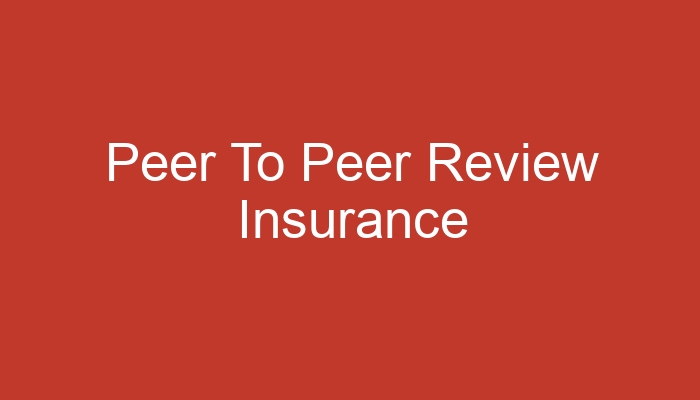Are you tired of dealing with traditional insurance companies that leave you feeling like just another number in their system? Do you want a more personal and community-oriented approach to protecting yourself and your assets?
Then peer-to-peer review insurance might be just what you need. In this blog post, we’ll explore the concept of P2P insurance and how it empowers individuals to take control of their coverage while building trust within a like-minded group. Get ready for a game-changing alternative that is shaking up the way we think about insurance!
What is Peer to Peer Review?
Peer to peer review is the process of having a group of peers review and provide feedback on a given insurance policy. This process can be used to help determine if the policy is fair and reasonable, as well as to identify any potential areas of improvement.
In order for a peer to peer review to be effective, it is important that the group of peers are representative of the broader population that the policy will affect. Additionally, the peers should have a good understanding of the insurance industry and the potential impacts of the policy in question.
The Pros and Cons of Peer to Peer Review
When it comes to seeking out insurance, there are a variety of options that consumers can choose from. One option is peer to peer review insurance, which essentially allows policyholders to review and rate their insurers. This type of system can be beneficial in a number of ways, but there are also some potential drawbacks that consumers should be aware of.
On the plus side, peer to peer review insurance can help policyholders make more informed decisions about their coverage. Because they can see how other people have rated their insurer, they can get a better sense of what to expect in terms of customer service and claims processing. This type of system also provides an opportunity for insurers to improve their offerings based on feedback from their customers.
On the downside, peer to peer review insurance can also lead to some unfair ratings. For example, if an insurer has a small number of reviews, it may be difficult to get an accurate picture of its performance. Additionally, reviewers may be biased towards or against certain insurers for personal reasons. As such, it’s important to take ratings with a grain of salt and look at them in context before making any decisions about coverage.
How does Peer to Peer Review impact the insurance industry?
Peer to peer review insurance, also known as P2P insurance, is a type of insurance product that is becoming increasingly popular in the sharing economy. P2P insurance is a form of insurance where policyholders pool their money together to pay for claims made by other members of the group. This type of insurance has many benefits, including the fact that it can be much cheaper than traditional insurance products. In addition, P2P insurance can be more flexible and tailored to the needs of policyholders.
The rise of the sharing economy has led to a growing demand for P2P insurance products. The sharing economy refers to the trend of people using collaborative platforms to share resources and services. Popular examples of the sharing economy include Airbnb, Lyft, and TaskRabbit. The growth of the sharing economy has created a need for new types of insurance products that are designed to meet the unique needs of sharing economy businesses and workers.
P2P insurance is well-suited to the sharing economy because it allows businesses and individuals to customize their coverage based on their specific needs. For example, a rideshare driver could purchase a P2P policy that covers them for accidents while they are working. A home-sharing host could purchase a policy that covers them for damages caused by guests. And an online marketplace could purchase a policy that protects sellers from fraudulent buyers.
What are the different types of Peer to Peer Review?
There are three different types of peer-to-peer review: insurance company reviews, state licensing board reviews, and hospital privileging reviews.
Insurance company reviews are conducted by other insurance companies in order to determine if a provider is a good risk. This type of review is also known as a “credentialing review.” State licensing boards may also conduct peer-to-peer reviews in order to ensure that providers are meeting the standards set for their profession. Hospital privileging reviews are conducted by hospitals in order to grant or deny clinicians the ability to practice at that facility.
Conclusion
Peer to peer review insurance can be a great way to protect yourself and your business from potential lawsuits. By working with professionals in the industry, you can ensure that they are properly insured while also receiving an unbiased opinion of any claims filed against them.
With this form of protection, businesses can feel more secure knowing that their peers support them and have reviewed their policies thoroughly before committing to anything. Ultimately, peer to peer review insurance is a cost-effective solution for businesses looking for extra security and peace of mind.

